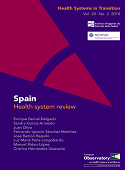Spain HiT (2018)

Download
The underlying principles and goals of the Spanish national health system continue to focus on universality, free access, equity and fairness of financing. The evolution of performance measures over the last decade shows the resilience of the health system to macroeconomic conditions, although some structural reforms may be required to improve chronic-care management and the reallocation of resources to high-value interventions.
Overall health status continues to improve
Life expectancy in Spain is the highest in the European Union (EU). Inequalities in self-reported health have also declined in the last decade, although long-standing disability and chronic conditions are increasing due to an ageing population.
After decreasing in 2009–2015, public health-care spending is on the rise
Public expenditure in health prevails, with public sources accounting for over 71.1% of total health financing. Yet private spending, mainly related to out-of-pocket payments, has increased over time, and it is now above the EU average.
Service provision characterized by the strength of primary care
Primary care remains the core element of the health system. Public health efforts over the last decade have focused on increasing health system coordination and providing guidance on addressing chronic conditions and lifestyle factors such as obesity.
Resilient health system despite economic crisis
Health system-specific measures to maintain the sustainability of the Spanish health system were implemented in the last decade, with no short-term impact on health outcomes. Structural measures, however, are needed to improve resource allocation and technical efficiency, as well as patients’ participation in decisions on their care.





















